Cover Story
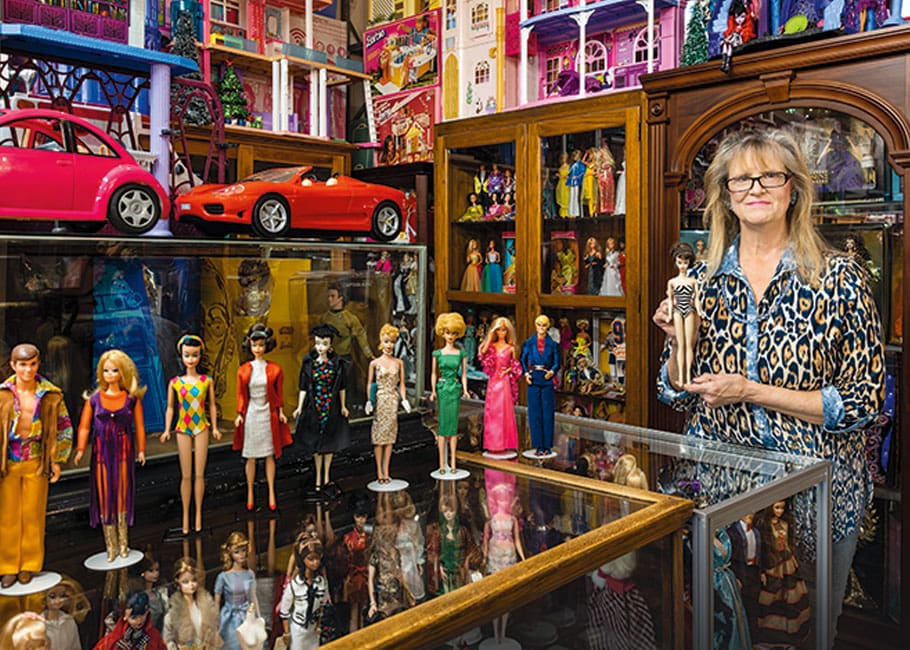
Elizabeth Kondruss with a Barbie wearing an original Barbie swimsuit. MELISSA MENZIES
Amazing amassing
Passion. Obsession. Nostalgia. Curiosity. Education. Sentimentality. Preserving history. Connecting with the past. Investment. Profit. Recognition. Community. Novelty. The thrill of the hunt. There are as many reasons for collecting as there are collectors and collections. We invited Costco members to share their stories.
Stories and editing by T. Foster Jones and Stephanie E. Ponder
The number of responses the Connection received was staggering. Here’s a look at a few of the submissions.
A Barbie girl
Elizabeth Kondruss of Stittsville, Ontario, fell under Barbie’s spell at the age of 9, when she subsequently took on two paper routes to buy a Live Action Barbie. Her love of the iconic toy has only grown.
Kondruss explains that she comes from an artistic family, and that she would make clothing for herself and then make outfits for her Barbies from the fabric scraps.
As Kondruss says, “I never drank or smoked; I just collected Barbie items.” Over the years, her collection has grown to more than 25,000 pieces that include dolls, clothing, furniture and more.
Currently, around 7,000 items from Kondruss’ collection are on display at the Barbie Museum that is part of Stittsville’s Carp Road Flea Market. Her goal is to display her entire collection—in the correct timeline—when she retires, and to have a workshop where she can sort through items and focus on restoration.
Mad about the Maple Leafs
“I started collecting hockey cards in the early ’70s. My dad would buy me a pack of O-Pee-Chee [OPC] hockey cards after my weekly house league hockey game. While I’m sure I had some good players, I was only interested in the Maple Leafs. On and off for the last 50 years or so, I have collected cards, never for money, just for the joy of it. Today, I have every Toronto Maple Leaf OPC card since 1967.”—Ed Lepp, St. Catharines, Ontario
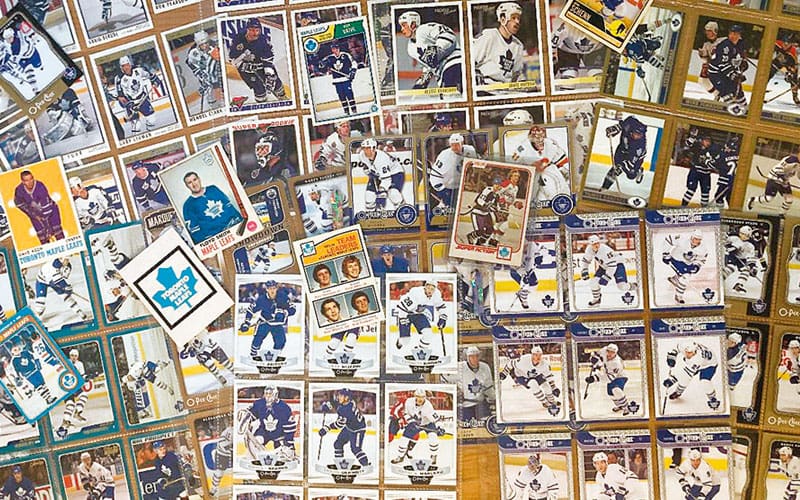
Ed Lepp’s hockey card collection
COURTESY OF ED LEPP
Instant classic
Gilberton Company published Classics Illustrated—comic book adaptions of novels such as The Three Musketeers, Ivanhoe, The Count of Monte Cristo and Moby Dick, among others—from 1941 until 1971. Munroe Auerbach of Victoria, British Columbia, started reading Classics Illustrated comics as an adolescent and began collecting them in the mid ’90s.
Auerbach owns all of the Canadian editions and all but three of the nearly 1,400 US editions. He currently has more than 4,000 comics in his collection—which includes every first edition and most of the reprints.
“I’ve become somewhat of an expert regarding the US and Canadian issues, and have published an essay detailing the 81 Canadian editions,” says Auerbach. “Many serious collectors have purchased this essay, and I’m currently working on an in-depth analysis of the US editions.”
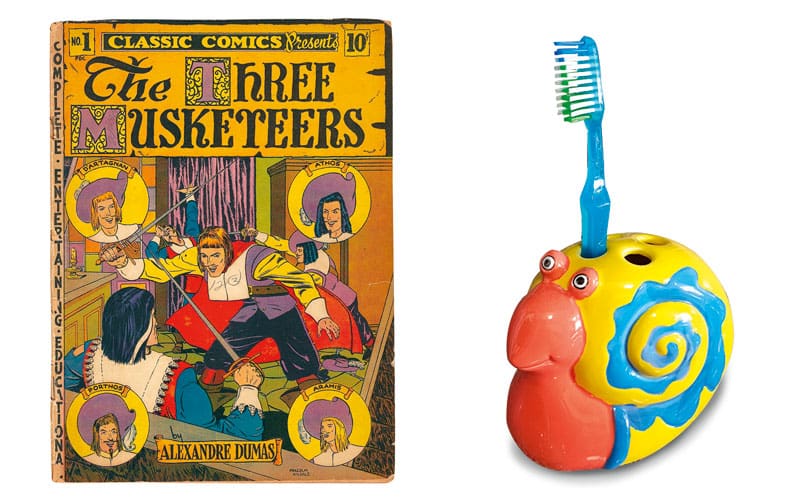
Munroe Auerbach’s original The Three Musketeers from Classic Comics / Snail toothbrush holder
MUNROE AUERBACH / ELAINE RAKCHAEV; JOANA ANG / stock.adobe.com
Slow and steady
Elaine M. Rakchaev of Etobicoke, Ontario, collects snails. “Not the slimy ones found in ponds or forest floors, but snail ‘stuff,’ ” she clarifies. Beginning in 1994 with a white porcelain snail planter, Rakchaev now counts 200-plus snails throughout her home, including a toothbrush holder, earrings, a lamp, clocks, a snow globe, a wind chime, wind-up toys and a boot scraper.
A hand in the cookie jar
Earl Ross and his wife, Kathy Fader, of Hamilton, Ontario, couldn’t have predicted how the purchase of one rabbit-shaped cookie jar would multiply into a collection of more than 1,000 cookie jars that are on display throughout their home.
Ross, a retired business consultant and former party clown, always liked going to antique shops and reseller stores. Now the search for cookie jars gives him and Fader added purpose for those visits. They’re so well known at their local haunts that vendors often set aside jars so Ross and Fader have the first chance to buy them.
The collection features animals, mascots, clowns (of course) and more—with a hippo serving as Ross’ current favourite. Despite the large number, his collecting philosophy is simple: “If it doesn’t make you smile, you don’t bother.”
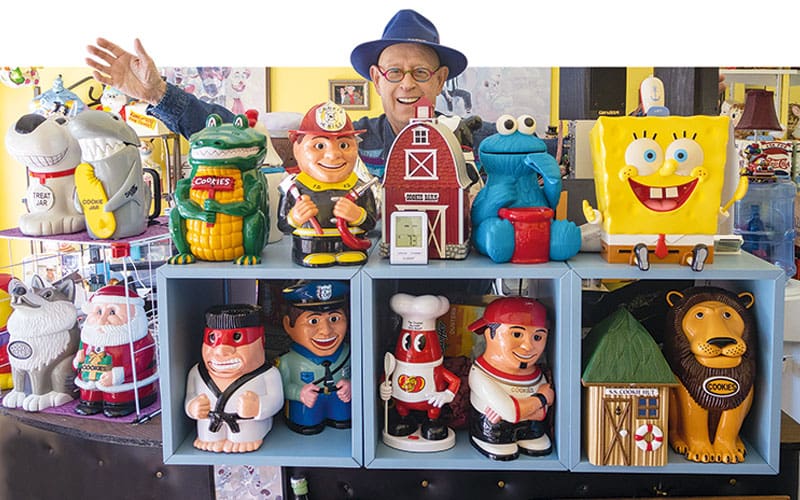
Earl Ross with part of his cookie jar collection
ADAM KURNELL MENDONCA
Phonograph home
“My husband, Brett, has been an antique phonograph collector for over 40 years. Our home is filled with breathtaking examples of phonographs dating back to 1898, some of the earliest Thomas Edison ever produced.
“We got started collecting in 1982 when we bought our first phonograph and it didn’t run. Brett took it completely apart and got it to run perfectly. We started going to swap meets looking for another phonograph. And another. Over the years, we have tracked down and purchased the rarest phonographs that we can find.
Phonograph collectors from around the world began contacting Brett, and he started a free YouTube channel to teach the next generation how to purchase, restore and play these beautiful machines. We have also had guests from all over the world come just to see the collection.”
—Cheryl Hurt, Simpsonville, South Carolina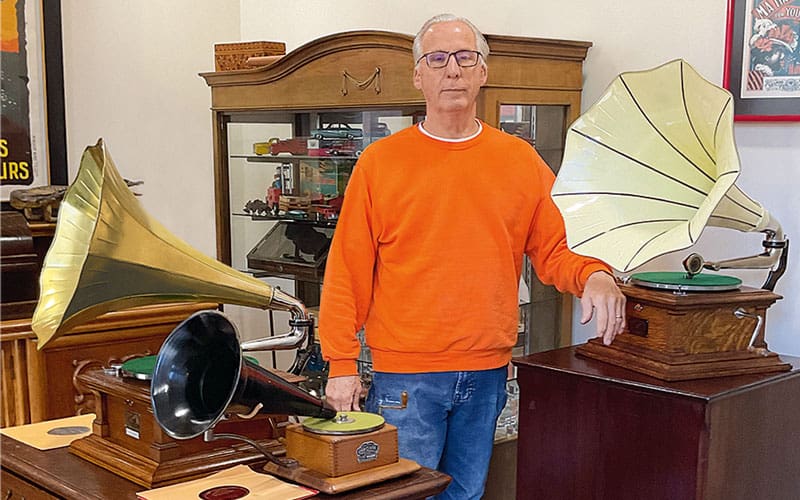
Brett Hurt restores antique phonographs
CHERYL HURT
Stamp of approval
Irv Osterer, an Ottawa-based artist, has been a lifelong stamp collector. For the past 10 years, he has been adding to his collection by topic. His chosen area of interest? Hanukkah.
“I thought it might be interesting to see how many Hanukkah stamps or postmarks are out there. Israel’s Hanukkah stamps were easy to come by—but for collectors, the chase is part of the fun, so I began searching online auction houses and exchanging information with [stampcollecting] groups and friends to build a collection of Hanukkah material. I discovered that several station post offices in the US had used Hanukkah postmarks and that several countries had issued Hanukkah stamps—including India, [which] co-issued a Hanukkah/Diwali series with the state of Israel,” says Osterer.
Having acquired quite a collection, Osterer made a pitch to Canada Post to consider a special Hanukkah postmark.
He explains, “[In 2021], my efforts were rewarded, and Canada Post used my design—so now Disraeli, Quebec, has a special Hanukkah postmark.”
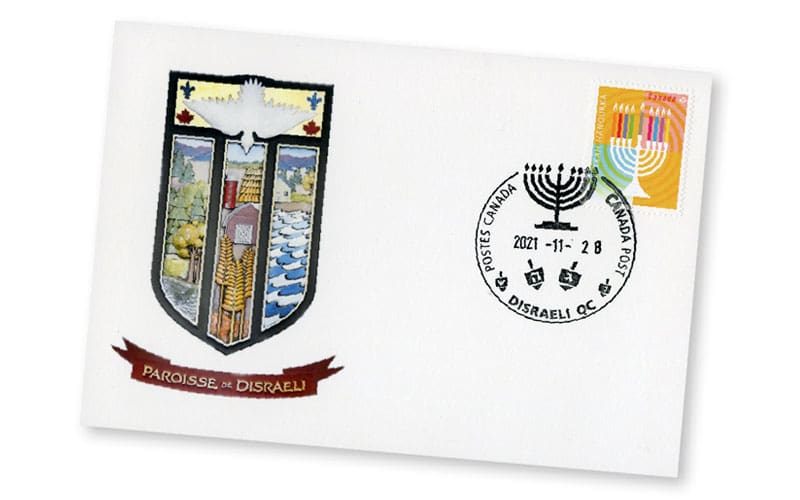
This Hanukkah postmark grew out of Irv Osterer’s love of stamps
COURTESY OF IRV OSTERER
Bee the best
Honey pots, John Doyle of Chislehurst, England, explains, have been made for centuries, and wherever honey is sold, honey pots can usually be found: “Major potteries around the world have, almost without exception, produced a honey pot at some point in their history.” Doyle’s passion for collecting and learning about them uncovered a lack of information, leading him to create The European Honey Pot Collectors’ Society in 1998 to share and develop knowledge on the subject with other collectors around the world.
Eventually, Doyle was approached by a publisher to write a small book on the subject, which was published in 2009. In addition to finding them at antique shops, malls, markets and charity shops, Doyle says that Costco has added several honey pots to his collection.
“To date I have over 3,000 honey pots in many different shapes, colours, decorations and materials,” including ones from the Victorian era.
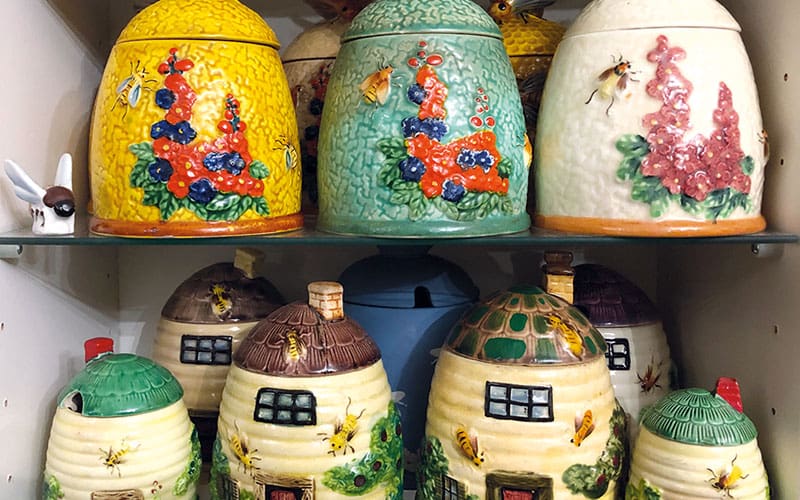
John Doyle has become an authority on honey pots
JOHN DOYLE
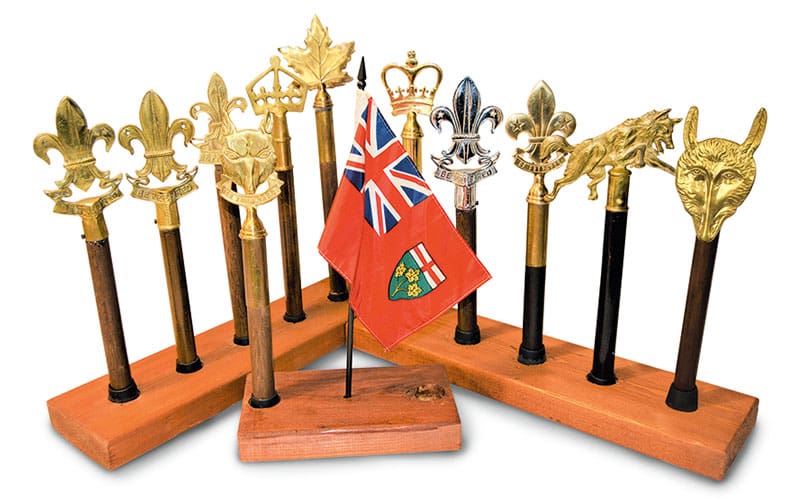
Ron Antonio’s Boy Scouts flagpole finial collection
Ron Antonio
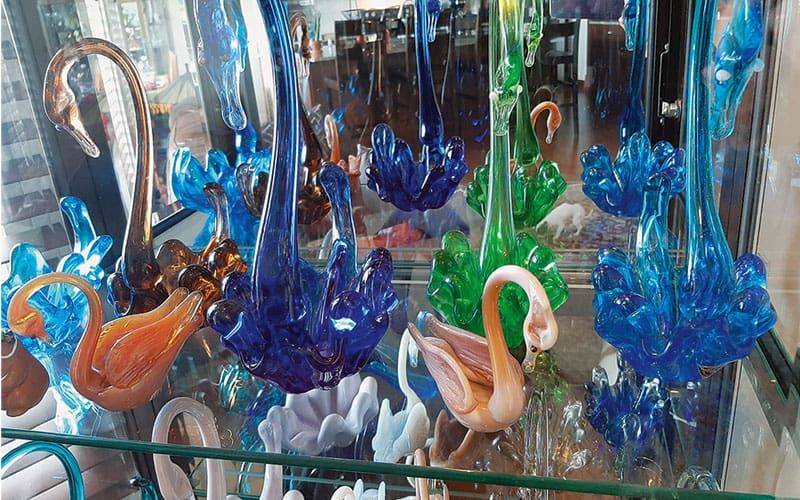
Daryl Kling’s Altaglass swans honour his mother
ALTAGLASS SWAN COLLECTION
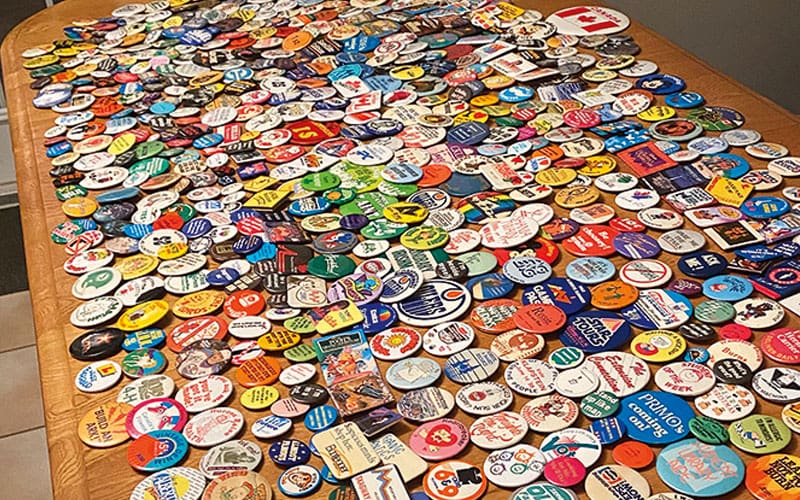
Karen Gwozd-Cornish of Edmonton, has more than 300 buttons
KAREN GWOZD-CORNISH
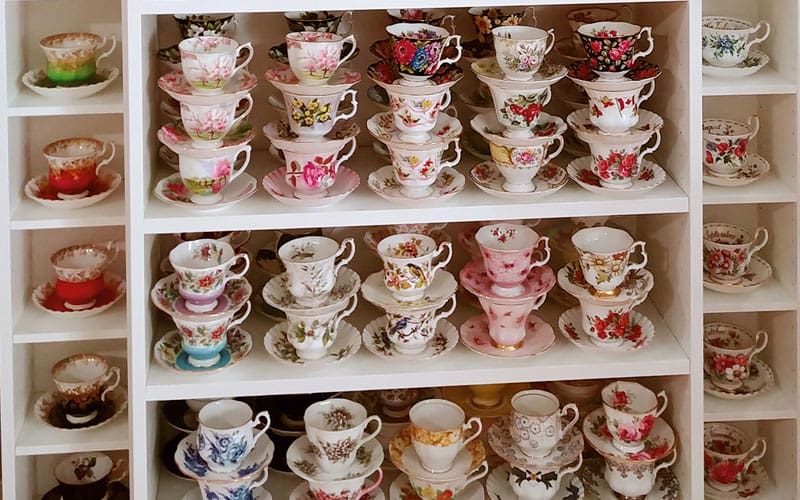
Some of Joana Ang’s fine bone china items
JOANA ANG
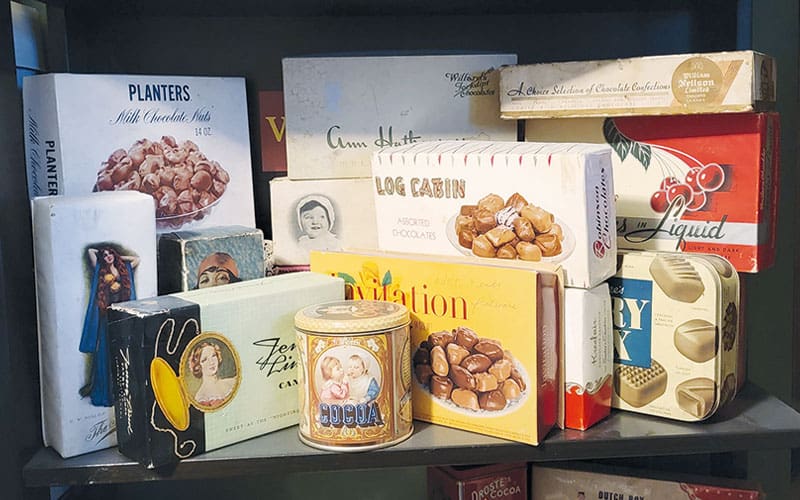
Chocolatier Lori Eisenberger’s collection includes pots, tins, moulds and more
LORI EISENBERGER
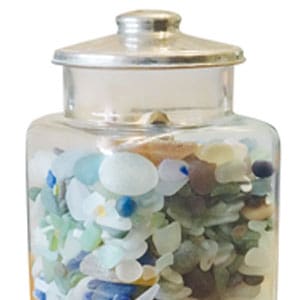
DONNA KIMBERLEY
Finders Keepers
“I collect sea glass and old pottery shards. It’s a fun and relaxing thing to do at the beach.
“My sons used to collect it for me when they were children, and after they grew, I began to find it myself. I have been collecting for about 15 years.
“The age of sea glass can be determined … by its colour and the thickness of the piece.
“The colours of the sea glass—aqua, mauve, yellow, pink— are lovely. The pottery shards come in a multitude of colours and patterns. Each small piece holds a sense of history and tucks easily into the palm of my hand.”—Donna Kimberley, Lincoln, Ontario
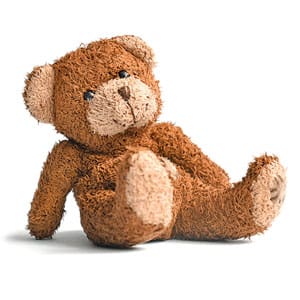
© KOJIN_NIKON / STOCK.ADOBE.COM
Name That Collector
If you collect it, there’s a name for it. Here are a few unusual ones.
Arctophilist: teddy bears
Brandophilist: cigar bands
Coleopterist: beetles
Deltiologist: postcards
Dipterist: flies
Falerist: medals, badges, pins
Horologist: clocks
Notaphilist: banknotes
Oologist: bird eggs
Phillumenist: matchboxes, matchbooks
Plangonologist: dolls
Scripophilist: bonds, share certificates
Tegestologist: beer coasters
Vecturist: subway tokens
Vexillologist: flags
—TFJ
